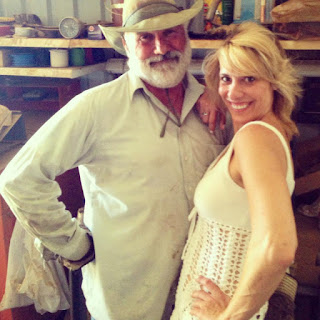Love Give Us One Death (Bonnie and Clyde in the Last Days) by Jeff P. Jones - Interview and Giveaway - Lone Star Book Blog Tour
LOVE GIVE US
ONE DEATH
Bonnie and Clyde in the Last Days
by
Jeff P. Jones
**WINNER: 2016 Idaho Author Award**
**WINNER: 2015 George Garrett Fiction Prize**
Genre: Historical Fiction
Publisher: Texas Review PressDate of Publication: October 25, 2016
Number of Pages: 232
Scroll down for Giveaway!
Bonnie and Clyde are the most famous outlaw pair in American history. Frank Hamer, the legendary Texas Ranger, was hired to stop them. Part prose, part verse, with historical artifacts interwoven, the well-researched novel tells the story of their deaths on a lonely Louisiana back road, as well as their bloody and short lives together. Its many voices invite the reader to become a ghost rider along with Bonnie and Clyde, while it also exposes the forces of injustice and greed that created them.
PRAISE FOR LOVE GIVE US ONE DEATH:
"If you are a fan of historical fiction, you must secure a copy of his debut novel in which Jones 'added, subtracted and distorted facts' adroitly and creatively in his re-telling of Bonnie and Clyde's last days. There are very few writers who can write like Jones -- in many voices and in various forms -- but he choreographs his work like an award-winning producer, designating him as unique as the members of the Clyde Barrow Gang." -Idaho Statesman
"Love Give Us One Death delivers not only a knock-out story of brutal adventure, and love, across the heartland of the Great Depression, but a story about the very character of the republic itself." -Robert Wrigley, Poet
"This is the history of love and destruction you didn’t know you needed. In a time of Public Enemies, we see the last legs of a journey between the violent and manic Romeo and Juliet-like pair. The last public outlaws are riding away into their last sunrise, and this book serves as its journal.” -Atticus Books
“The language is absolutely stunning. Characterization, historical setting, ambience are all accurate and depicted with great clarity. A terrific achievement.” -Mary Clearman Blew, Author of All But the Waltz
“This is historical fiction raised boldly to the level of myth.” -Tracy Daugherty, Author of The Last Love Song
Author Interview #2: Jeff Jones
Each chapter ends with two, usually short, sections, one that refers to the Dust Bowl and one to prison conditions. Why those two types of repeated references?
John Neal Phillips is to thank for uncovering the abuse Clyde suffered at Eastham prison farm. This is an aspect of the novel that I hope finds contemporary resonance. The US has the highest rate of incarceration in the world. More than 2 million Americans behind bars. Another 5 million on parole. That’s more than were held in Stalin’s gulag in the 1930s. US prisons are still rife with abuse, and privatizing the prison system has meant that concern for shareholder profit trumps that of prisoner treatment.
Dostoevsky said, “The degree of civilization in a society can be judged by entering its prisons.” The prison industrial complex—and, it follows, prisoner abuse—in the US will only grow. Ralph Fults said of Clyde Barrow that he went into Eastham as a schoolboy and came out as a rattlesnake. That’s not rehabilitation but its opposite—the very creation of a hardened criminal. So, yeah, I believe that prison abuse changes the character of our republic. What Clyde suffered in prison made him into the cold-blooded killer he was never meant to be, and twelve men, most with families, lost their lives because Clyde vowed never to return to prison—that’s how desperate he was to stay free. Once I understood his central motivation—to avoid further prison abuse—I couldn’t tell the story without highlighting the source of his desperation.
And the Dust Bowl references?
One of the earliest images that haunted me when working on this story was those black dusters—the dust storms in the 1930s. As beautiful as rolling farm fields might be, my imagination always goes to what was lost by putting all this land to the plow—prairie grass, forests, wilderness, habitat. And when I visit Texas, I’m always struck by how hard-used the land feels. It’s been plowed, drilled, mined, clear-cut, shaped, and soaked in blood, and it feels like that even in the relatively remote places. William O. Douglas’s Farewell to Texas had a profound impact on me, as did having visited a strip mine near my ancestral east Texas home years ago.
One of the earliest images that haunted me when working on this story was those black dusters—the dust storms in the 1930s. As beautiful as rolling farm fields might be, my imagination always goes to what was lost by putting all this land to the plow—prairie grass, forests, wilderness, habitat. And when I visit Texas, I’m always struck by how hard-used the land feels. It’s been plowed, drilled, mined, clear-cut, shaped, and soaked in blood, and it feels like that even in the relatively remote places. William O. Douglas’s Farewell to Texas had a profound impact on me, as did having visited a strip mine near my ancestral east Texas home years ago.
The image I want to evoke with the environmental thread is that nature bites back. This is the connection with prison abuse, too. Both types of abuse have repercussions. We can’t get away with evil on a big scale—government policies included—and expect no consequences. There’s always payback. As the floodgates of failed sharecroppers poured into Dallas in the 1920s and earlier, wasn’t it inevitable that some of them would come to challenge the powers-that-be? Can’t you see resolving out of the dust raised by that tractor—the dust cloud condensing and molding and hardening—the shape of a Ford V8? And inside as it passes, can’t you see two figures, themselves formed from the very same dust?
What was the best part of writing this book?
Finally letting it go. I mean, I have all these things I want the reader to take away—an appreciation for how powerless Bonnie and Clyde were in their initial circumstances, for instance. They simply decided to take what power they could, and at the time that meant big guns and fast cars. But, yeah, they had no jobs. No money. No access to jobs and money. Yet they were surrounded by images of a better life. So they made that grab. I hope the reader understands something about why they did what they did.
But in the end, I’m happy to give this over to the reader. My work’s done. Sylvia Plath said that once a poem’s made public, it belongs to the reader. At this point, after seven and a half years, I’m happy to cede interpretive control and let others tell me what it means.
--------------------------------------
GIVEAWAY! GIVEAWAY! GIVEAWAY! GIVEAWAY!
5 Winners! One winner wins poster & signed copy; Four winners win signed copies!
(US ONLY)
December 13 - December 22, 2016
CHECK OUT THE OTHER GREAT BLOGS ON THE TOUR:

blog tour services provided by:



















Comments